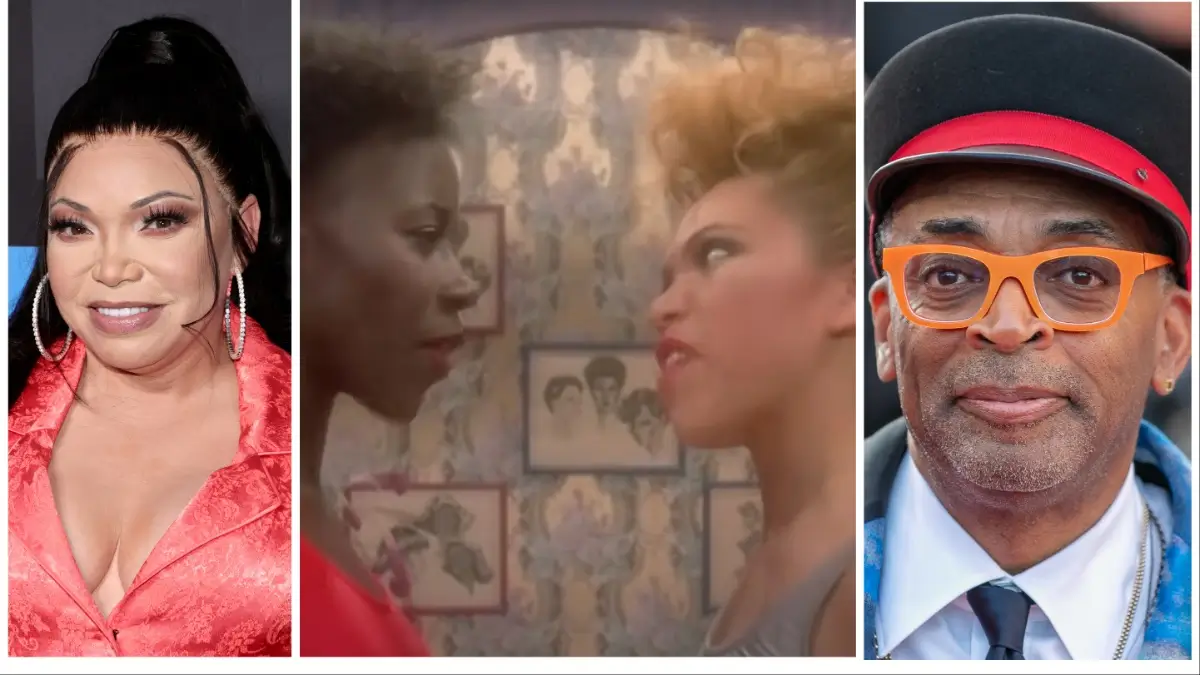A clip of Tisha Campbell revealing that Spike Lee separated the cast’s dark-skinned actresses from the light-skinned actresses while filming his movie “School Daze” has resurfaced.
Lee’s 1988 movie about fraternities and colorism at an all-Black college also starred Laurence Fishburne, Giancarlo Esposito, Kyme, Lee and others. Campbell, who played Jane Toussaint, leader of the “Wannabees,” a group of light skinned women with bone-straight hair.

According to the “Martin” actress, Lee intended to create “true tension” between the women for the movie, so he put the dark-skinned actresses and the light-skinned actresses in separate hotels with different accommodations.
She claims he created further tension by putting all of the male actors in the nicer hotel with light-skinned female cast members.
“So, Spike put all the light-skinned girls in one hotel, a nicer hotel,” said Campbell. “He put the dark-skinned girls in a motel. Then he put all the boys, not just you know both factions, he put all the boys in a light-skinned hotel with — I mean — in the light-skinned girls’ hotel.”
The 55-year-old actress went on to note that she hung out with the actresses staying in the motel the majority of the time.
“But it was to create real method chaos, right? It was a social [experiment], absolutely, to create the true tension,” she added, “and it worked. But I think after that moment of the fight scene, I was like, ‘Yeah, method acting cool, but I gotta turn the light off.’ Like, I work, I turn the light on. I don’t work, I turn the light off. This, I can’t do this. I’m going over to everybody else’s motel and hang out with them.”
Fans did not appreciate Lee’s social experiment and called the separation “a workplace violation” on X.
One user replied, “Sidenote? Spike actually put the lighter skin Black actresses in better hotel conditions, than the Darker skin Black actresses to create real animosity. It’s always the question, how far, is going to far to create art?”
Why is my timeline looking like this right now? pic.twitter.com/KEdIP70Hbv
— Strictly 4 My X’ers (@Lizzs_Lockeroom) April 22, 2024
“Oh that’s not cultivating art, that’s a legitimate discriminatory workplace violation,” replied another X user. “These people are professionals and it is their job to ACT. this was so uncalled for.”
“That’s nasty work,” wrote one fan. “He didn’t need to do that? And even if he did why did the darker skin women have to get the worse treatment? His decision was definitely not just for ‘art,’” echoed another.
Other fans didn’t seem to mind Lee’s colorism experiment. “He forced them into method acting and in turn, it created a timeless film. the routes people go to, to create aren’t always orthodox but they yield incredible results,” wrote one X user. “Unnecessary but the fact he thought to combine a social experiment with his art in order to immerse the actresses is slightly intriguing,” added one.
Campbell added that she was the youngest on the set, and the rest of the “School Daze” cast took her in during filming. She also recalled that she and the other lead actress, Kyme, who played the leader of the dark-skinned woman known as the “jiggaboos,” on the set for two weeks before the rest of the cast and had stayed in the same hotel. However, once they found out they were being separated, they cried.
“When he was moving her, we were crying,” Campbell recalled as she imitated the scene of Nettie and Celie being separated in “The Color Purple.”
“We were crying because we bonded,” she continued. “We was like, ‘I don’t understand why he’s doing this to us.’ We did not get it.”
The actress went on to talk about colorism and noted that it is very real.
“No it’s true and it’s real. There is a thing of light skinned privilege. It is very real that people have had to deal with,” said Campbell. “We are just now celebrating melanin. We are just now coming into understanding how beautiful black truly is, our own people. You know what I mean?”
“School Daze” is available now for viewing on Netflix.


